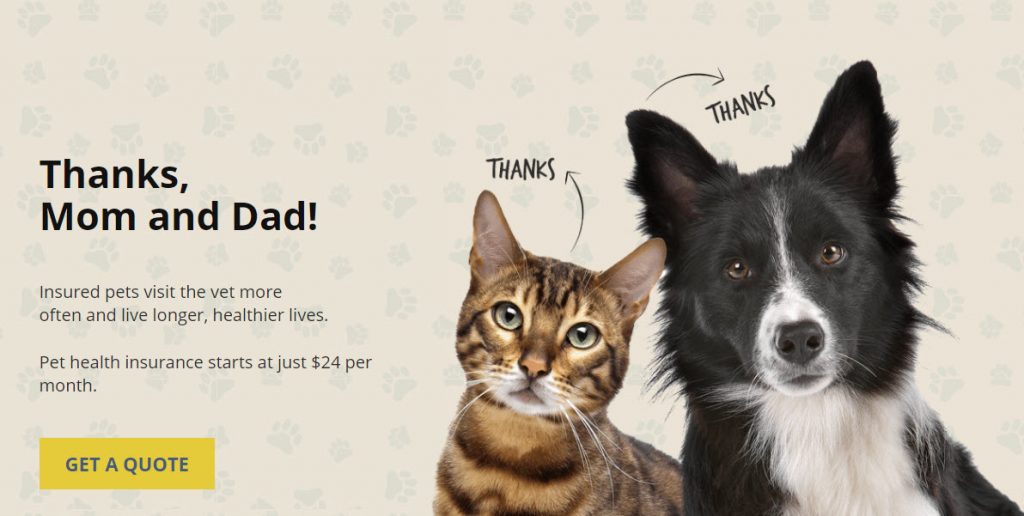Hypothyroidism In Dogs
Free Pet Insurance Comparison
Compare Quotes From Top Companies and Save
Secured with SHA-256 Encryption
Dr. Pippa Elliott BVMS, MRCVS
Veterinarian
Dr Pippa Elliott BVMS, MRCVS is a veterinarian with over 30 years of experience in companion animal practice. In 1987 she graduated from the University of Glasgow, with a degree in veterinary medicine and surgery. She works at Blythwood Vets and the People’s Dispensary for Sick Animals (PDSA). Pippa is an advocate of Fear-Free Practice, an animal addict, and a veterinary writer. She is also w...
Veterinarian
UPDATED: Mar 22, 2024
Pet Insurance U receives compensation from the third parties included on this site. This includes payment for clicks from our site to insurance providers’ sites and quote requests generated. Our rankings and reviews are not affected by payments from the insurance companies. The compensation we receive allows the site to be free and regularly updated. Our goal is to review every pet insurance provider, but not all companies are listed on the site.
And many of the companies we review do not pay us anything. We simply rate, compare and review their plan because we feel it will be valuable to you. Our reviews are guaranteed to be unbiased, professional and advertising compensation does not influence rankings.
We are a free online resource for anyone interested in learning more about pet insurance. Our goal is to be an objective, third-party resource for everything pet insurance related. We update our site regularly, and all content is reviewed by pet insurance experts.
UPDATED: Mar 22, 2024
Pet Insurance U receives compensation from the third parties included on this site. This includes payment for clicks from our site to insurance providers’ sites and quote requests generated. Our rankings and reviews are not affected by payments from the insurance companies. The compensation we receive allows the site to be free and regularly updated. Our goal is to review every pet insurance provider, but not all companies are listed on the site.
And many of the companies we review do not pay us anything. We simply rate, compare and review their plan because we feel it will be valuable to you. Our reviews are guaranteed to be unbiased, professional and advertising compensation does not influence rankings.
On This Page
Hypothyroidism is an endocrine disorder where the thyroid glands do not function properly.
The thyroid glands are in charge of producing the hormones thyronine (T3) and thyroxine (T3) and calcitonin. The hormones T3 and T4 regulate metabolism.
Dogs with hypothyroidism have decreased levels of either T3 or T4, or both. Hypothyroidism is often suspected in dogs that have trouble with weight gain or obesity and suffer from hair loss and skin problems.
The causes of canine hypothyroidism include congenital disease, iodine deficiency, cancer and medical treatment (iatrogenic).
Need Pet Insurance?
FACT: Pet insurance pays up to 90% of vet bills when your pet is sick or injured!
Symptoms of Hypothyroidism In Dogs

The most common symptoms of hypothyroidism in dogs are the following:
- Lethargy
- Generalized weakness
- Dry hair coat
- Decreased Heart Rate
- Excessive scaling
- Fat deposits in eyes
- Recurring skin infections
- Intolerance to cold
- Exercise intolerance
- Mental dullness
- Unexplained weight gain
- Hair loss (alopecia)
- Excessive hair shedding
- Poor hair growth
Enter your ZIP code below to view companies that have cheap pet insurance rates.
Secured with SHA-256 Encryption
Causes of Hypothyroidism in Dogs
It can be difficult to pinpoint the cause of hyperthyroidism. However, hypothyroidism is usually caused by one of the following:
Lymphocytic Thyroiditis
Lymphocytic thyroiditis is the most common cause of hypothyroidism and is generally thought to be an autoimmune disease. This disease occurs when either there is an inflammation of the thyroid (thyroiditis) or the dog’s body thinks that the thyroid gland either foreign or abnormal and thus attacks it.
Related: 10 Things You Must Know Before You Buy Pet Insurance
Congenital Hypothyroidism
Congenital hypothyroidism is less common but usually occurs in puppies that have an underdeveloped thyroid.
Cushing’s Disease
Cushing’s disease can also cause hypothyroidism due to the imbalance of thyroid levels.
Diet
A poor diet that lacks the proper nutrients can also lead to hypothyroidism because a dog is getting extra additives that the dog’s body will reject.
Weight gain and lack of exercise can also be contributing factors.
Environment
Your dog’s environment including too much exposure to toxins, over-vaccinating a dog and even some steroids can contribute to thyroid issues.
Real Cost Savings from PetFirst Clients

Luna
PetFirst saved his parents
$6,712
A happy energetic Luna one morning couldn’t hold her food down. After months of multiple costly vet visits to specialists and an endoscopy, the problem was discovered and fixed. Luna put 22 pounds back on in no time and her parents were grateful for having PetFirst by their side to pay the bills.
Cancer of the Thyroid Gland
Although rare, cancer of the thyroid gland can also lead to hypothyroidism.
Breeds Most Affected by Hypothyroidism
Hypothyroidism is more common in medium to large-sized dogs of 4 to 10 years of age.
The following breeds are more pre-disposed to the condition:
- Boxers
- Cocker Spaniels
- Dachshunds
- Doberman Pinschers
- Great Danes
- Golden Retrievers
- Irish Setters
- Labradoodles
- Miniature Schnauzers
- Old English Sheepdogs
- Poodles
Diagnosis of Hypothyroidism
Your vet will usually perform a few tests to see if your dog has developed hypothyroidism.
The most common test is a screening to check the total Thyroxin levels which is done through blood work to test the thyroid levels. If your dog has a lower level of Thyroxin, this usually indicates hypothyroidism.
Your vet may also want to do a urinalysis and complete blood work to make sure there aren’t any other conditions or illnesses.
X-rays and diagnostic scans can help determine if there any thyroid tumors causing the hypothyroidism. If tumors are present, surgery or radiation might be necessary if the tumors are malignant and/or causing the hypothyroidism.
Treatment of Hypothyroidism
Hypothyroidism is treatable, but not curable and requires life-long treatment with hormones and dietary restrictions at home.
Your vet will prescribe a type of thyroid replacement hormone based on the dog’s size and weight.
After a month or so of treatment, the vet will take a blood sample to make sure that your dog is getting the right dosage.
Your dog will be on the prescribed medication for the duration of your dog’s life.
Most clinical symptoms will be resolved after a few months.
Enter your ZIP code below to view companies that have cheap pet insurance rates.
Secured with SHA-256 Encryption
Prevention
The best way to prevent your dog from developing hypothyroidism is to feed your dog a properly balanced diet and to keep your dog’s weight under control. Exercise, of course, helps as well.
Read more: How Often Should Your Dog Exercise?
Genetics does play a big factor but a lot is to be said of keeping your dog lean.
Can Pet Insurance Help with Hypothyroidism?
If your dog has hypothyroidism, pet insurance can help with the costs of the consistent testing that needs to occur and well as the prescribed medication.
But, pet insurance will only cover the condition if it isn’t pre-existing and you are already signed up with a plan.
This is exactly why it’s best to insure your dogs’ when they are young and before any new conditions occur.
With pet insurance plans saving you anywhere from 70% to 90% of the treatment and testing costs for the duration of your dog’s life, that can really add up in the long run!
Plans like Healthy Paws and Embrace will help you with the costs of long term illnesses like hypothyroidism which can be very helpful.
Living and Management
Dogs with hypothyroidism can live long, healthy lives as long as you keep your dog on the prescribed medication and are diligent with the follow-up vet visits.
Blood work is very important because too much or too little of the thyroid medication can be dangerous to your dog.
Otherwise, your dog can still thrive and live a happy life.
If you want to learn more about other possible health problems that might occur with your dog, our dog health glossary is a great place to start!
Other articles you may find helpful:
Is Exotic Pet Insurance Necessary?
The Best Pet Insurance By State
Fun Facts, Dog FAQ, And Unsolicited Dog Advice
5 Training Commands to Save Your Dog’s Life
The Ultimate Guide to Safe Foods for Dogs
We get it, your dog is like your child and when your puppy or dog has health problems it is scary. Luckily there is pet insurance companies that will help you pay for any veterinarian care they made need. Checkout the best puppy and dog pet insurance companies and learn about common puppy health issues and ailments in older pets.
Common Health Problems:
Chronic Active Hepatitis in Dogs
Cruciate Ligament Tear in Dogs
Degenerative Myelopathy | Spinal Cord Disease In Dogs
Dementia in Dogs | Canine Cognitive Dysfunction
Dog Comedones (Schnauzer Bumps)
Dog Diarrhea: What Can You Do To Help?
Gallbladder Obstruction in Dogs
Heart Murmurs In Dogs | How To Identify Them
Intervertebral Disc Disease In Dogs
Nasal Solar Dermatitis In Dogs
Progressive Retinal Atrophy In Dogs
The Dog Flu – Symptoms & Treatment for Canine Influenza


Frequently Asked Questions
What causes hypothyroidism in dogs?
The causes of canine hypothyroidism can include congenital disease, iodine deficiency, cancer, medical treatment (iatrogenic), lymphocytic thyroiditis (an autoimmune disease), congenital hypothyroidism, Cushing’s disease, poor diet, environmental factors, and, although rare, cancer of the thyroid gland.
How is hypothyroidism diagnosed in dogs?
Diagnosis involves various tests, including a screening for total Thyroxin levels through blood work. Additional tests such as urinalysis and complete blood work may be conducted to rule out other conditions or illnesses. X-rays and diagnostic scans may be used to identify thyroid tumors causing hypothyroidism.
What are the common symptoms of hypothyroidism in dogs?
The most common symptoms of hypothyroidism in dogs include weight gain or obesity, hair loss, skin problems, and difficulties with metabolism. These symptoms may indicate decreased levels of thyroid hormones (T3 or T4) in the dog.
What causes hypothyroidism in dogs?
The causes of canine hypothyroidism can include congenital disease, iodine deficiency, cancer, medical treatment (iatrogenic), lymphocytic thyroiditis (an autoimmune disease), congenital hypothyroidism, Cushing’s disease, poor diet, environmental factors, and, although rare, cancer of the thyroid gland.
Can hypothyroidism in dogs be treated?
Hypothyroidism in dogs is treatable but not curable. Treatment involves life-long administration of thyroid replacement hormones and dietary restrictions. Regular follow-up visits and blood tests are crucial to ensure the right dosage. Most clinical symptoms typically resolve after a few months of treatment.
How can hypothyroidism in dogs be prevented?
Preventive measures include feeding dogs a properly balanced diet, maintaining an optimal weight, and providing regular exercise. While genetics can play a role, keeping dogs lean and healthy can contribute to preventing hypothyroidism.
Can pet insurance help with the costs of hypothyroidism in dogs?
Yes, pet insurance can assist with the costs of consistent testing and prescribed medication for hypothyroidism. However, coverage is subject to the condition not being pre-existing, and it’s advisable to enroll in a plan when the dog is young and before any new conditions occur.
How long can dogs with hypothyroidism live?
Dogs with hypothyroidism can live long, healthy lives with proper treatment and care. Regular blood work is essential to ensure the correct dosage of thyroid medication, and diligent follow-up vet visits contribute to a dog’s overall well-being.
Enter your ZIP code below to view companies that have cheap pet insurance rates.
Secured with SHA-256 Encryption
Dr. Pippa Elliott BVMS, MRCVS
Veterinarian
Dr Pippa Elliott BVMS, MRCVS is a veterinarian with over 30 years of experience in companion animal practice. In 1987 she graduated from the University of Glasgow, with a degree in veterinary medicine and surgery. She works at Blythwood Vets and the People’s Dispensary for Sick Animals (PDSA). Pippa is an advocate of Fear-Free Practice, an animal addict, and a veterinary writer. She is also w...
Veterinarian
We are a free online resource for anyone interested in learning more about pet insurance. Our goal is to be an objective, third-party resource for everything pet insurance related. We update our site regularly, and all content is reviewed by pet insurance experts.


